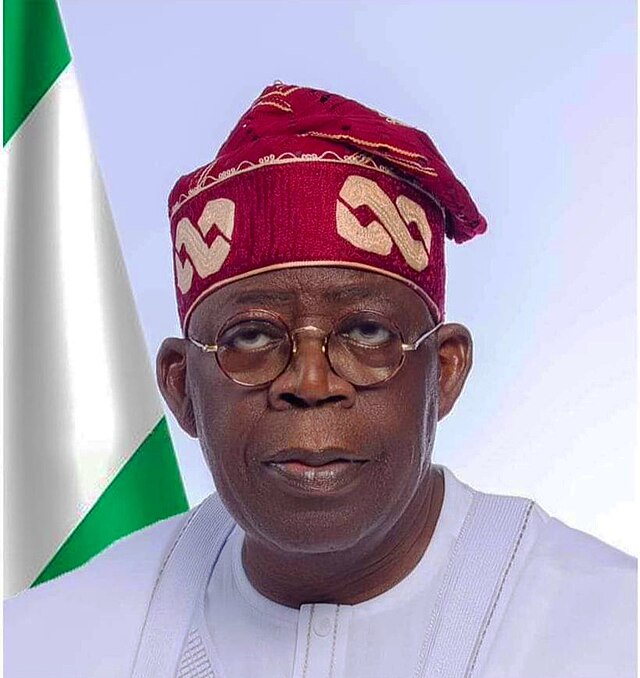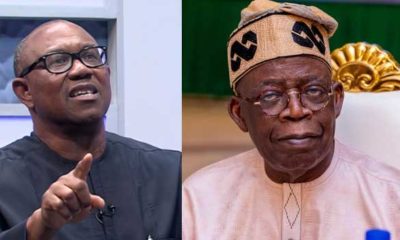NEWS
JUST IN: Presidency Shreds New York Times’ Nigeria’s Worst Economic Crisis Report

The Presidency has come out with a rejoinder on the New York Times’ feature article on the excruciating economic situation confronting Nigeria.
This was detailed in state house statement under the signature of the Special Adviser to President Tinubu on Information and Strategy, Bayo Onanuga, which he put out under his verified X handle.
Issued under the subject, ‘NEW YORK TIMES’ JAUNDICED REPORT ON NIGERIA’S CURRENT ECONOMIC SITUATION’, it maintained that the feature article “reflected the typical predetermined, reductionist, derogatory, and denigrating way foreign media establishments reported African countries for several decades.”
The Presidency wants the world to know that the reform introduced by the President Bola Ahmed Tinubu administration are already yielding dividends, with exchange rate having peaked at almost N2,000/$ and slowing downing to below N1,500/$.
Investors and foreign lenders were also beginning to demonstrate faith in the domestic economy.
Onanuga pointed out that “The economy recorded a trade surplus of N6.52 trillion in Q1, as against a deficit of N1.4 trillion in Q4 of 2023. Portfolio investors have streamed in as long-term investors. When Diageo wanted to sell its stake in Guinness Nigeria, it had the Singaporean conglomerate, Tolaram, ready for the uptake. With the World Bank extending a $2.25 billion loan and other loans by the AfDB and Afreximbank coming in, Nigeria has become bankable again. This is all because the reforms being implemented have restored some confidence.”
In addition, he noted that Nigeria was not the only country passing through economic challenges, noting that event he Untied States was also experiencing her own share of economic turmoil.
“Nigeria is not the only country in the world facing a rising cost of living crisis. The USA, too, is contending with a similar crisis, with families finding it hard to make ends meet. US Treasury Secretary Janet Yellen raised this concern recently. Europe is similarly in the throes of a cost-of-living crisis,” he added.
The statement reads, “Ruth Maclean and Ismail Auwal’s feature story with the title ‘Nigeria Confronts Its Worst Economic Crisis in a Generation’, published on June 11, reflected the typical predetermined, reductionist, derogatory, and denigrating way foreign media establishments reported African countries for several decades.
“Because of the misleading slant of the report, we need to clear up some misconceptions conveyed by the reporters as regards the economic policies of the Tinubu administration that came into power at the end of May 2023.
“Most significant about the report was that it painted the dire experiences of some Nigerians amid the inflationary spiral of the last year and blamed it all on the policies of the new administration. The report, based on several interviews, is at best jaundiced, all gloom and doom, as it never mentioned the positive aspects in the same economy as well as the ameliorative policies being implemented by the central and state governments.
“To be sure, President Tinubu did not create the economic problems Nigeria faces today. He inherited them. As a respected economist in our country, once put it, Tinubu inherited a dead economy. The economy was bleeding and needed quick surgery to avoid being plunged into the abyss, as happened in Zimbabwe and Venezuela. This was the background to the policy direction taken by the government in May/June 2023: the abrogation of the fuel subsidy regime and the unification of the multiple exchange rates.
“For decades, Nigeria had maintained a fuel subsidy regime that gulped $84.39 billion between 2005 and 2022 from the public treasury in a country with huge infrastructural deficits and in high need of better social services for its citizens. The state oil firm, NNPC, the sole importer, had amassed trillions of naira in debts for absorbing the unsustainable subsidy payments in its books. By the time President Tinubu took over the leadership of the country, there was no provision made for fuel subsidy payments in the national budget beyond June 2023. The budget itself had a striking feature: it planned to spend 97 percent of revenue servicing debt, with little left for recurrent or capital expenditure. The previous government had resorted to massive borrowing to cover such costs. Like oil, the exchange rate was also being subsidized by the government, with an estimated $1.5 billion spent monthly by the CBN to ‘defend’ the currency against the unquenchable demand for the dollar by the country’s import-dependent economy. By keeping the rate low, arbitrage grew as a gulf existed between the official rate and the rate being used by over 5000 BDCs that were previously licensed by the Central Bank. What was more, the country was failing to fulfil its remittance obligations to airlines and other foreign businesses, such that FDIs and investment in the oil sector dried up, and notably Emirate Airlines cut off the Nigerian route.
“President Tinubu had to deal with the cancer of public finance on the first day by rolling back the subsidy regime and the generosity that spread to neighbouring countries. Then, his administration floated the naira.
“After some months of the storm, with the naira sliding as low as N1,900 to the US dollar, some stability is being restored, though there remain some challenges. The exchange rate is now below N1500 to the dollar, and there are prospects that the naira could regain its muscle and appreciate to between N1000 and N1200 before the end of the year. The economy recorded a trade surplus of N6.52 trillion in Q1, as against a deficit of N1.4 trillion in Q4 of 2023. Portfolio investors have streamed in as long-term investors. When Diageo wanted to sell its stake in Guinness Nigeria, it had the Singaporean conglomerate, Tolaram, ready for the uptake. With the World Bank extending a $2.25 billion loan and other loans by the AfDB and Afreximbank coming in, Nigeria has become bankable again. This is all because the reforms being implemented have restored some confidence.
“The inflationary rate is slowing down, as shown in the figures released by the National Bureau of Statistics for April. Food inflation remains the biggest challenge, and the government is working very hard to rein it in with increased agricultural production. The Tinubu administration and the 36 states are working assiduously to produce food in abundance to reduce the cost. Some state governments, such as Lagos and Akwa Ibom, have set up retail shops to sell raw food items to residents at a lower price than the market price. The Tinubu government, in November last year, in consonance with its food emergency declaration, invested heavily in dry-season farming, giving farmers incentives to produce wheat, maize, and rice. The CBN has donated N100 billion worth of fertiliser to farmers, and numerous incentives are being implemented. In the western part of Nigeria, the six governors have announced plans to invest massively in agriculture.
“With all the plans being executed, inflation, especially food inflation, will soon be tamed.
“Nigeria is not the only country in the world facing a rising cost of living crisis. The USA, too, is contending with a similar crisis, with families finding it hard to make ends meet. US Treasury Secretary Janet Yellen raised this concern recently. Europe is similarly in the throes of a cost-of-living crisis. As those countries are trying to confront the problem, the Tinubu administration is also working hard to overturn the economic problems in Nigeria.
“Our country faced economic difficulties in the past, an experience that has been captured in folk songs. Just like we overcame then, we shall overcome our present difficulties very soon.”
NEWS
Corps Members Safe In Benue, Gov Alia Assures As Orientation Kicks Off
The Governor of Benue State, Rev. Fr. Hyacinth Alia, has assured corps members deployed to the state of their safety, despite rising security concerns across the region.
Speaking on Friday through the Commissioner for Youth, Sports Development and Creativity, Hon. Terkimbi Ikyange, Governor Alia said his administration is working closely with security agencies to ensure the safety and well-being of all National Youth Service Corps (NYSC) members throughout their service year.
“Sadly, our nation is currently bedevilled with security challenges, and Benue State is not exempt,” the governor stated.
“However, let me quickly allay your fears and assure you that, as a government, we are committed to ensuring that your safety is guaranteed throughout your stay in the state.”
He noted that comprehensive protective measures have been implemented across corps lodges and other areas occupied by corps members in the state.
Governor Alia also encouraged the new corps members to take full advantage of the NYSC’s Skills Acquisition and Entrepreneurship Development (SAED) programme, describing it as a “gateway to great opportunities.”
He further urged them to use their God-given talents to contribute meaningfully to the nation’s development.
In her remarks, the State Coordinator of the NYSC, Mrs. Veronica Garba, thanked the governor and the people of Benue for their continued support of the scheme.
She charged the new inductees to actively participate in the four cardinal components of the orientation course: physical training, motivational lectures, sporting activities, and SAED.
The orientation exercise welcomed a total of 1,600 corps members, officially inducted into the programme by Justice Peter Ukande, who represented the Chief Judge of Benue State, Justice Maurice Ikpambeae.
NEWS
Ministry Appoints New Director For DUFUTH, Uburu

The Federal Ministry of Health and Social Welfare has approved the appointment of a new Acting Director of Administration for the David Umahi Federal University Teaching Hospital (DUFUTH), Uburu.
This was contained in a statement in Uburu on Thursday by the DUFUTH’s Public Relations Officer, Agwu N. O.
According to Agwu, the new appointee is Edith Anih, an indigene of Enugu State with relevant working experience, having worked at the University of Nigeria Teaching Hospital (UNTH), Enugu, where she was Deputy Director of Administration.
It was gathered that the approval was conveyed in a letter dated April 23, 2025, addressed to the Chief Medical Director.
Prior to her appointment, Anih held the position of Deputy Director of Administration at the University of Nigeria Teaching Hospital (UNTH), Enugu.
ALSO READ: CVFF- House of Reps Backs Marine & Blue Economy Ministry
He wrote, “Mrs. Anih Edith Ndidi is a seasoned administrator born on May 22, 1973. She is married and hails from Enugu State, specifically Enugu South Local Government Area.
“She holds a Bachelor’s degree in Public Administration and a Master’s degree in Human Resources Management. She is also an associate member of the Institute of Health Service Administrators of Nigeria (IHSAN).
“The Management of DUFUTH extends a warm welcome to the new DA and looks forward to collaborating with her as she brings a fresh perspective to the hospital’s administrative leadership.”
NEWS
FG To Launch Forensic Audit Of NNPCL Amid Economic Reforms, Says Edun
The Federal Government of Nigeria is set to launch a forensic audit of the Nigerian National Petroleum Company Limited (NNPCL), in a major move aimed at enhancing transparency and accountability in the oil and gas sector.
This was disclosed by the Minister of Finance and Coordinating Minister of the Economy, Wale Edun, at the ongoing Nigerian Investor Forum, held on the sidelines of the IMF/World Bank Spring Meetings in Washington DC.
READ ALSO: Loans Necessary For Budget Despite High Revenue Collections – Wale Edun
Edun explained that the upcoming audit, along with recent changes in NNPCL management, is part of a broader effort to reform the state-owned oil company and rebuild trust in Nigeria’s economic institutions.
Addressing top global investors, including representatives from financial giant J.P. Morgan, Edun outlined a series of bold economic reforms introduced by the administration of President Bola Tinubu.
He said the measures are already yielding positive results and have laid a strong foundation for future growth.
“Our goal is not just to maintain this momentum, but to accelerate it,” Edun said. “We are targeting seven per cent annual growth, and we believe the policies we have implemented have laid the groundwork to achieve this.”
According to Edun, Nigeria’s economy grew by 3.84% in the fourth quarter of 2024, with an overall annual growth rate of 3.4%.
He described the government’s economic strategy as “unprecedented,” adding that key indicators such as the budget deficit, trade balance, and exchange rate have all shown signs of improvement.
“We said we would do it, and now we have done it. This time, we’re staying the course,” he emphasized.
The minister also highlighted the government’s focus on agriculture as a critical driver of economic growth, saying efforts are underway to close the food supply gap by empowering local producers.
“We aim to close the food supply gap, not by importing more, but by enabling domestic producers to scale and innovate,” he said.
In the area of infrastructure, Edun announced that 90,000km of fibre optic cable has been rolled out to boost internet connectivity, especially for young Nigerians and the tech ecosystem.
Additionally, 4,000km of roads have been earmarked for private sector participation, with the first 1,000km already approved for construction.






















